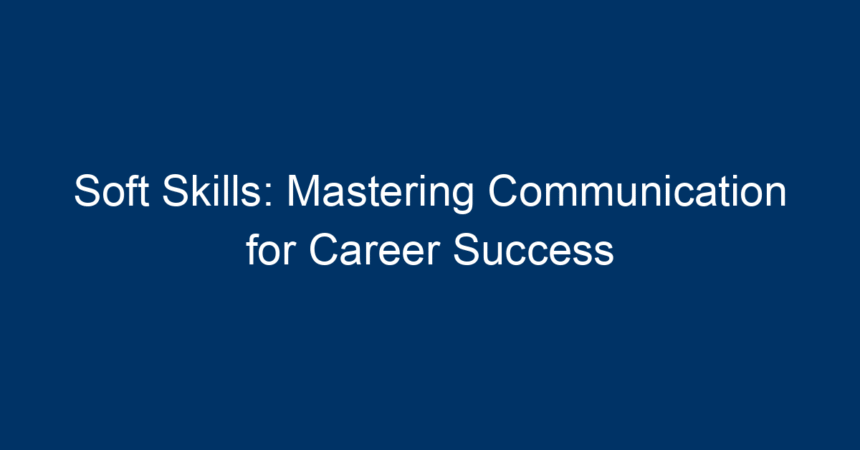In today’s competitive job market, it’s not just technical capabilities that land you the position you desire. Increasingly, employers are looking for candidates who excel in soft skills, particularly communication. Mastering these skills can not only enhance your career but transform the way you interact in both personal and professional realms. In this comprehensive article, we’ll explore the significance of soft skills, delve into effective communication techniques, and provide actionable insights to help you master this essential component of workplace success.
Understanding Soft Skills and Their Importance
What Are Soft Skills?
Soft skills encompass a range of interpersonal attributes and communication skills that are crucial for navigating the workplace effectively. Unlike hard skills, which are specific to technical understanding (like programming or accounting), soft skills include emotional intelligence, teamwork, adaptability, and, most importantly, communication.
Why Are Soft Skills Important?
-
Enhancement of Technical Skills: Technical expertise is necessary, but without the ability to communicate ideas clearly, those skills can go unnoticed or misunderstood.
-
Improved Workplace Relationships: Excellent communication fosters positive relations with coworkers, clients, and supervisors. This can lead to better teamwork and increased job satisfaction.
-
Career Advancement: Employers often prioritize soft skills when promoting staff. Those who can articulate ideas clearly and build effective relationships tend to stand out in career progression.
- Adaptability in Changing Environments: Communication skills grant flexibility. In an ever-evolving job market, being able to convey thoughts and adapt to new information is invaluable.
The Statistics Speak
According to a LinkedIn survey, 57% of leaders say soft skills are more important than hard skills. Moreover, a study by the World Economic Forum indicates that by 2025, skills such as emotional intelligence and communication will be among the top skills needed in the workplace. This highlights the urgent need to master soft skills to remain competitive.
The Pillars of Effective Communication
Effective communication is fundamental to mastering soft skills. Here are the core components to focus on:
1. Active Listening
Active listening involves fully concentrating, understanding, responding, and remembering what has been said. Here’s how to master it:
- Focus on the Speaker: Maintain eye contact and avoid distractions.
- Provide Feedback: Nod, summarize, or ask clarifying questions.
- Avoid Interrupting: Let the speaker finish their thoughts before responding.
2. Clear and Concise Language
Using simple and straightforward language can help convey your message effectively. Here’s how to improve clarity:
- Avoid Jargon: Only use industry-specific terms when necessary, and ensure they are understood by your audience.
- Stay On Topic: Strive for brevity and make your point in as few words as possible.
- Use Examples: Illustrate your points with relatable examples to enhance understanding.
3. Non-Verbal Communication
Understanding body language, facial expressions, and tone is crucial in communication:
- Awareness of Body Language: Ensure that your body language aligns with your verbal messages. Open gestures can encourage dialogue.
- Facial Expressions: Positive facial expressions can elevate a conversation and make it more engaging.
- Tone of Voice: Be aware of your tone, as it can significantly alter the perception of your message.
4. Empathy
Empathy plays a significant role in effective communication. It involves understanding the feelings and perspectives of others. Here’s how to practice empathy:
- Put Yourself in Others’ Shoes: Try to understand others’ emotions and viewpoints before responding.
- Acknowledge Feelings: When engaging in difficult conversations, acknowledge the feelings of those involved to foster understanding.
5. Adaptability
Being adaptable means adjusting your communication style based on the audience’s needs. Here are tips for adaptability:
- Know Your Audience: Tailor your communication style to suit your listeners, whether they are technical experts or laypeople.
- Be Open to Feedback: Accepting constructive criticism and adapting your message accordingly shows maturity and willingness to improve.
Practicing Soft Skills in the Workplace
1. Participate in Workshops
Many organizations offer workshops and training sessions focusing on developing soft skills. Participating in these can provide structured insights and practices.
2. Seek Feedback
Regularly ask colleagues for feedback on your communication style. Constructive criticism will help you identify areas of improvement.
3. Engage in Role-playing Situations
Role-playing can be an effective way to practice various communication scenarios. This can range from handling difficult conversations to effective negotiation techniques.
4. Leverage Technology
Utilizing communication tools such as Slack or Microsoft Teams can aid in practicing written communication skills. Engaging in discussions on these platforms encourages clarity and conciseness.
The Role of Emotional Intelligence in Communication
What is Emotional Intelligence?
Emotional intelligence (EQ) involves recognizing, understanding, and managing your own emotions and those of others. It is intricately tied to soft skills and effective communication.
Why is EQ Important?
Having a high level of emotional intelligence can enhance your interpersonal communication abilities, leading to better relationships and collaboration in the workplace. Individuals with strong EQ can navigate social complexities and understand emotional cues, making them more effective communicators.
Conclusion: Actionable Insights for Mastering Soft Skills
Mastering soft skills, particularly communication, is essential for career success in today’s dynamic workplace. Here’s a quick recap of actionable insights:
- Invest Time in Learning: Participate in workshops and read books focused on developing soft skills.
- Practice Active Listening: Make it your goal to listen more than you speak in conversations.
- Seek Constructive Feedback: Regularly ask your peers how you can improve your communication.
- Embrace Adaptability: Tailor your communication style based on your audience and context.
- Grow Your Emotional Intelligence: Focus on understanding emotions—both yours and others’—to enhance interactions.
In conclusion, by recognizing the importance of soft skills and making a conscious effort to improve communication, you can significantly impact your career growth and relationships in the workplace. Remember, every conversation is an opportunity to master these vital skills. Start practicing today, and watch your career flourish!




